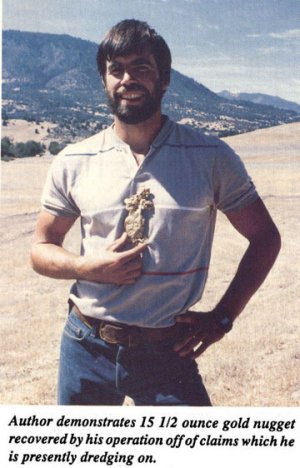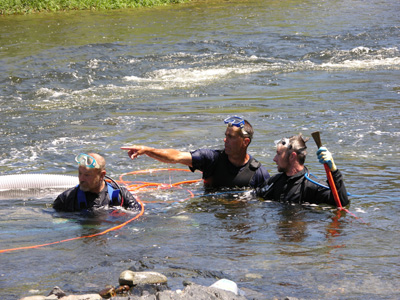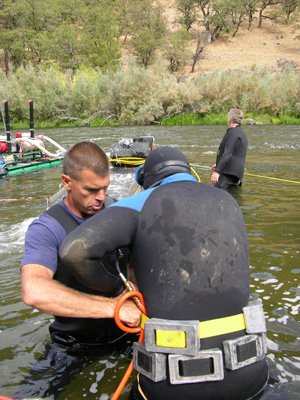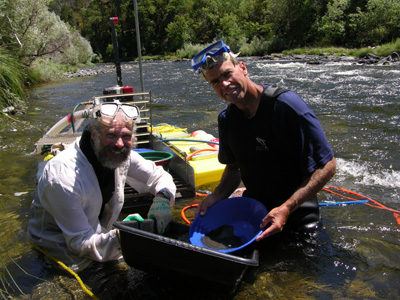By Dave McCracken
Showing people how to find high-grade gold has as much to do with developing the proper focus as it does with passing along helpful information.

 Running a successful mining operation is one thing. Helping someone else to be able to run a successful operation is something else altogether. During the past several years, we have worked with hundreds of people in basic gold mining techniques and dozens of men and women in commercial underwater mining procedures. We have also had the opportunity to observe many others conduct their own mining operations in Africa, South and Central America, Alaska, Canada, Indonesia, Cambodia, Viet Nam, Madagascar and along the rivers of Northern California. Working with the theories and procedures, you are also working with the person’s ability, or lack of ability, to apply the principles.
Running a successful mining operation is one thing. Helping someone else to be able to run a successful operation is something else altogether. During the past several years, we have worked with hundreds of people in basic gold mining techniques and dozens of men and women in commercial underwater mining procedures. We have also had the opportunity to observe many others conduct their own mining operations in Africa, South and Central America, Alaska, Canada, Indonesia, Cambodia, Viet Nam, Madagascar and along the rivers of Northern California. Working with the theories and procedures, you are also working with the person’s ability, or lack of ability, to apply the principles.
A number of years ago, it became apparent that future growth and success of my own commercial activities in this field would depend, in part, on our ability to guide others in successful gold mining procedures–not just in theory, but in actual application. As part of our effort to improve our capabilities, I have personally devoted quite a lot of effort trying to understand why some people (a healthy percentage, actually) cannot seem to acquire the ability of practical application of successful mining and sampling procedures–even though they apparently understand all of the theory behind them.
 I personally know a fair number of successful gold miners; some who we worked with and some who learned on their own. Some are successful on a smaller-scale. Some mine gold to support themselves and their families.
I personally know a fair number of successful gold miners; some who we worked with and some who learned on their own. Some are successful on a smaller-scale. Some mine gold to support themselves and their families.
I also know a fair number of rather unsuccessful miners, some who we have given some help to and others who would not accept help if their lives depended upon it.
Unquestionably, there is a distinct difference between successful miners, partially successful miners, and those who are completely unsuccessful. A fundamental way to explain the differences is with the concept of wavelengths.
Consider the idea that each person is similar to an electronic frequency radio tuner, and that the universe consists of an infinity of possible frequencies which can be tuned in. I propose a theory that successful gold miners have themselves more finely tuned on a particular frequency than those who are not so successful.
Why is it that sometimes you try and tell a person how to do something better, when the person obviously does not know how to do it properly–but the person won’t listen, won’t understand, wants to disagree, becomes suspicious of you, won’t accept help or rejects your information? Helpful information is coming the person’s way, but the person is not tuned to the frequency to receive and utilize the signal. In fact, he may be tuned to a rejection-frequency.
 One of the primary common denominators I recognize being present in successful miners alike is a never-ending drive, or hunger, or urge to get on and stay on the pay-streak during their mining activities. You can actually SEE this drive or hunger as part of their beingness. This urge is similar to an entrepreneur looking for a good investment opportunity, or a businessman wanting to close a profitable deal, or a musician trying to create an exceptional melody, or the drive an athlete has to win a race.
One of the primary common denominators I recognize being present in successful miners alike is a never-ending drive, or hunger, or urge to get on and stay on the pay-streak during their mining activities. You can actually SEE this drive or hunger as part of their beingness. This urge is similar to an entrepreneur looking for a good investment opportunity, or a businessman wanting to close a profitable deal, or a musician trying to create an exceptional melody, or the drive an athlete has to win a race.
All gold miners WANT to be successful and find lots of gold. The difference is that successful miners CREATE success by learning how to do it, by hustling around to find the best opportunities, and by actually making success happen. The best simply have themselves more finely tuned and focused on the desired wavelength!
Unsuccessful people often allow themselves to be diverted off the wavelength by little losses, or unknowns, along the way–or by little decisions: “I can’t do it,” “I don’t know,” “I’m not good enough,” “It’s too hard, etc.”
As an example, I can look back to my own involvement with gymnastics in high school. I was moderately successful–enough to become co-captain of our team during my senior year. But there were others we competed against who were far better than me.
I look at these kids today who are near perfection and realize that I was never really even in the league. Why? At the time I felt that those who were better had more inherent gymnastics ability than I did. But the truth is that they were more focused into advanced-gymnastics perfection than I was. This made them better gymnasts. There is no rightness or wrongness in this; you end up receiving exactly what you focus upon.
Someone more sympathetic might say that I lacked the proper coaching. And I’m sure thaey are right that exteriour environmental factors play a part in this. But even the best coach cannot help a person who insists upon setting fixed personal limitations.
My ex wife’s son, Derek Parra, wanted to be the world’s fastest speed roller-skater. He finished high school a half year early with honors; and with no money or financial support, moved to Florida where he could be near a world-class coach. He made the world skating team in his first year and took a gold medal at the World Games. When he realized that roller skating would not make it into the Olympic games during his time, he made the very difficult move of switching from the top of the roller world to the lower-end of ice skating. But within several years, he worked his way up to take gold and silver metals in the Olympics. Now that is focus far beyond coaching!!
 I’m focused on being the world’s best underwater mining specialist–and on helping others, also, to be very good at it.
I’m focused on being the world’s best underwater mining specialist–and on helping others, also, to be very good at it.
In working at this, I am finding that showing people how to do it only partially has to do with passing along helpful information. It actually seems more to do with developing the proper focus. This is why hands-on experience is so enormously valuable in any field.
If I wanted to be an expert at computer programming, I would spend the necessary time learning the basics and then devote myself, at any cost, for a year or two working under the guidance of a proven master. Why? Because the Master is riding directly on the frequency of success in this endeavor. His tuner is locked onto the precise channel I am searching for. My time is valuable. Why spend ten years trying to attain the successful frequency when I can learn it from a master in one tenth the time?
There is a big difference between having an understanding of the theory of mining, and having the ability to apply knowledge perfectly to obtain the optimum result.
The following is a short list of some of the differences I have noticed between successful and unsuccessful people — both inside and outside of the field of gold mining:
Receiving Help: Successful people willingly and gladly accept help wherever it is needed. They also tend to be freely willing to extend a helping hand to others who are in need. Unsuccessful people have a perverted idea of help, sometimes expecting others to do the job for them— and then being suspicious of the helpers, wondering what their malicious intent might be. They might refuse help to others altogether–or help somebody so they can gain leverage over them. Some refuse help from others, feeling they don’t deserve it–or sometimes feel that to accept help would be admitting failure. Such people are almost impossible to help.
Handling Data and Knowledge: Successful people, and those on their way towards success, tend to be hungry for new and more information which they can utilize to boost themselves towards accomplishment. Each piece of useful information is learned with care, sorted properly as to its importance and usefulness, and held in standby as another tool in a never-ending drive for success.
Unsuccessful people often can be spotted trying to be “experts,” trying to “remember” bits and pieces of information to prove to others they know what they are talking about.
Most often, because of lack of true focus on accomplishing a goal, the unsuccessful person also has an inability to evaluate the different degrees of importance of information. For example, such a person might not understand (as far as his ability to apply knowledge in the gold-finding field), that the datum “Gold is six times heavier than gravel” is substantially-more important than “Gold is an excellent conductor of electricity.” An electrician would see the second datum as more important. A successful miner knows the first datum is more important to him, because it is a far more useful tool, by today’s methods, in finding where gold deposits are located.
Focus and Intention: You cannot be an expert at everything. Successful people choose the areas in which they want to do well and focus their attention and intention (getting on the frequency) at becoming good in those areas.
Such people are a breeze to train. If you are not telling them how to do it, they are figuring it out for themselves. Unsuccessful people tend to focus either too narrowly–where they cannot evaluate importance, or too broadly — where they don’t have the necessary attention or intention to follow through. Often, unsuccessful people tend to focus on failure, problems, barriers, or resentments, rather than focus on what needs to be done to get on with progress.
Handling setbacks: There is no one who hates a failure more than a predominantly-successful person! However, many very valuable lessons are learned the hard way by doing things less than perfect the first few attempts–especially when treading on new territory. Successful people generally have enough personal drive to learn from mistakes and keep pushing forward even though there may be some pain and discomfort during the process.
Unsuccessful people tend to collapse because of setbacks, resulting in the primary focus staying on the problems, rather than achievement of the goal of success. After a time, small setbacks add up to a major failure – which eventually results in the person giving up altogether on the endeavor. We see this quite regularly in gold mining, when a person is in the prospecting phase and doesn’t find a pay-streak right away.
The successful person, even while hurt during setbacks, recovers from the loss, re-focuses on the goal, throws off the negative energy, feeds on the gains, and keeps moving forward as best he or she can.
Dealing With Success: Many unsuccessful people don’t do well because they do not feel they deserve to. But most often you will find them consciously blaming others for their problems and failures. Lack of responsibility for one’s self and one’s actions goes hand in hand with failure. Along with this, you will find unsuccessful people constantly upset and resentful at the success of others who are working more energetically towards accomplishment of life’s goals.
I can often tell who my true friends are not; those who are disappointed every time I get into an excellent pay-streak!
Generally, successful miners are happy to see others do well–unless the other happens to be someone who is first to a person’s secret hot spot. A successful miner might be a bit envious of another’s gold find–but probably not resentful. And if anything, he is most likely to spur himself on to work harder to find a better hot spot of his own.
Personal Integrity: This is most important, so I left it for last. What kind of person am I? Certainly there will not be much personal improvement if we are not willing to look at what we are, and be honest with ourselves about what we see.
Don’t like what you see? Change it–don’t bury it! Everyone is somewhere on the scale from heaven to hell. The direction upward is through personal honesty, integrity and willingness to improve those things you see in yourself which you are not pleased with. The way downward is to not look, to hide from yourself, and to be ruled by those things inside yourself that you don’t like…
Cheaters never really win! Because, by definition, a person who feels he must cheat to win is below the level of actually playing the game in the first place. Therefore, cheaters are really living in a game of their own–not truly in communication with those around them. Giving up your true self, your real happiness and your personal well-being, is a huge price to pay for having some temporary material belongings.
There are a lot of unhappy people around who act like they are happy. Look around. What do you think their problem is? However, even their game is not over. Wherever a person finds him or herself, the road continues in two directions.
 Successful people win their games by focusing themselves towards accomplishment within the rules of the game. Don’t like the rules? Do something effective to bring about agreement to have the rules changed. Winning the game by the rules brings great satisfaction, and successful people are willing to put out the necessary effort to gain each step along the way. Sure, it’s always a bit more difficult to not take the unethical short cuts which present themselves. But real progress is built upon a solid foundation of the ability to accomplish.
Successful people win their games by focusing themselves towards accomplishment within the rules of the game. Don’t like the rules? Do something effective to bring about agreement to have the rules changed. Winning the game by the rules brings great satisfaction, and successful people are willing to put out the necessary effort to gain each step along the way. Sure, it’s always a bit more difficult to not take the unethical short cuts which present themselves. But real progress is built upon a solid foundation of the ability to accomplish.
Unsuccessful people can often be found looking for the short cuts, the get-rich-quick schemes, or are willing to bend the rules–or cheat outright to win the game the easy way. Ultimately, such gains are only temporary because they are not built upon a foundation of the ability to create or perform–only the ability to take advantage of shortcuts.
Personal integrity is most important, because a person’s ultimate success in life, or mining, or any other endeavor, starts from his or her own source-point, wherever that may be. A person low in personal integrity may not allow himself to succeed, regardless of how hard we try and train him! The desire to be a successful gold miner, computer programmer, athlete, or good husband, is an impulse that begins and ends with the individual. And if the person isn’t being honest with himself, who he is, what he is, what he is doing, what principle he stands for, and where he truly wants to go, then it’s more than likely the person will not have the necessary drive to become truly successful at mining.
So you can see, there is more to helping a person to become successful than just showing him or her how to do it right. Sometimes, you also have to help get the person onto the success-frequency. And when you have accomplished this, then you have struck real pay-dirt.
- Here is where you can buy a sample of natural gold.
- Here is where you can buy Gold Prospecting Equipment & Supplies.
- More gold mining adventures
- More about suction dredging
- More about how to prospect for gold
- Schedule of upcoming events
- Books and Videos by Dave McCracken





